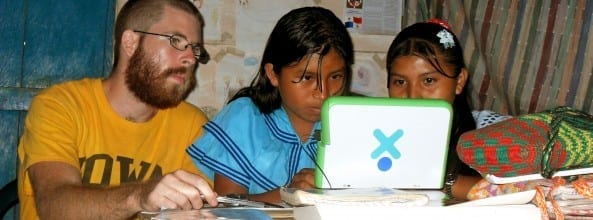

Daniel Cole was a memorable medical student interviewee, to say the least. One Sunday, the Peace Corps volunteer flew home from Panama to Minneapolis and went directly to a mall to get fitted for a suit. That Tuesday, he interviewed at DMU; on Wednesday, at the University of Iowa; on Friday, he was on a plane back to Panama.
“One really positive part of that was that I had so much going on at the time, I didn’t have time to stress myself out over the interviews,” he says.

Perspectives gained during his two years in the Peace Corps helped, too. To get to his site in the indigenous Comarca Ngäbe-Buglé, Cole traversed the Inter-American Highway, then rode in the back of a truck till the road ran out, and then hiked 45 minutes up mountainous terrain to the village. He began his Peace Corps tenure by completing a community analysis, in which he worked with community members to determine local needs. The major projects he then helped implement included improving water safety and sanitation there, which involved repairing a 20-year-old aqueduct and building 24 pit latrines.
“For the latrines, we had to hike in all the supplies, including 90-pound bags of cement. Pouring concrete there is no easy task,” he recalls. “Still, I was lucky because I had projects I could see finished.”
Cole had had Peace Corps service on his radar since high school, when he participated with his church in a service trip in the Dominican Republic. As a psychology undergraduate at the University of Iowa, he studied abroad in Chile, where he honed his Spanish-speaking skills. After working a year as a research assistant at Iowa, he decided it was time.
“Getting ready to transition from undergraduate to medical school, I thought it would be a good time to take a break,” he says. “The Peace Corps is a way to do positive things without having to pay for it yourself.”
Those “positive things” include building relationships he now treasures.
The Peace Corps is a good option “if you’re self-directed and open to all kinds of experiences,” Daniel Cole says. “Being laid-back and having a sense of humor help.”
“The other Peace Corps volunteers I met are some of my best friends now,” he says. “The kids in the community would come to my house every day after school. I brought coloring supplies and a deck of cards. I’d have three to eight students every day hanging out, making art, playing games. I really miss the kids.”
The school was powered not by electricity – which it didn’t have – but by its solar panels, which fueled Cole’s $99 laptop. He taught the 26 middle-school children basic computer skills.
“Most had never touched a computer. They’re a really marginalized group among Latino groups and have a lot of self-doubt,” he says. “It’s funny now looking back – it was a real challenge teaching the kids to double-click. It’s a fine motor skill they’re weren’t used to using.”

Given the Ngäbe name “Iyiko,” Cole also offered sessions to the adult villagers on general public health and on “soft” skills such as running meetings, seeking funding for community improvement projects and then managing them. When the Navy flagship U.S.S. Iwo Jima deployed to Central and South Americas in summer 2010 for Continuing Promise, a humanitarian civic assistance mission, the U.S. Embassy in Panama coordinated with the Peace Corps office to arrange for translators; Cole volunteered to help in Punta Peña. He met Panamanian President Ricardo Martinelli when he toured the ship and again at a swearing-in ceremony for a group of Peace Corps volunteers Cole helped train.
Through his experiences, Cole gained lifelong friendships and life-changing views. He’s now gaining medical skills he’ll use as he continues to help others, including by participating in DMU’s health service trip to Honduras in March.
“Being in the Peace Corps was a very different experience, and what I was looking for,” he says. “I learned that if I can do two years of that, I can do two years of anything.”

